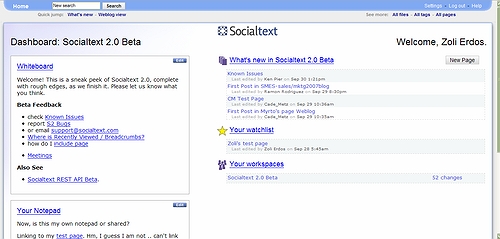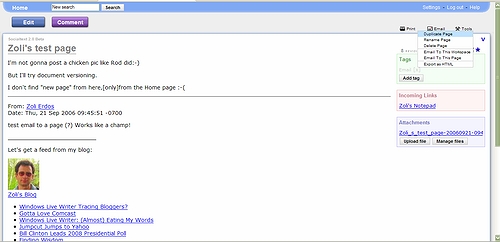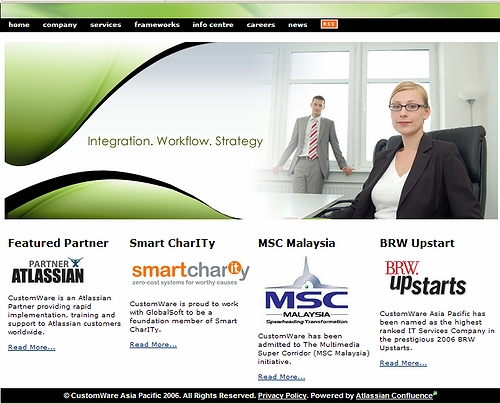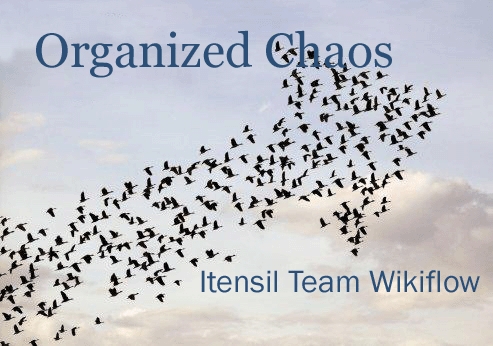I might as well have titled this post Radar Delay – first it was due last Friday, as part of series of reviews leading up to the Under the Radar: Office 2.0 event, but then fellow Enterprise Irregular Rod Boothby posted an “extra” article the same day, so I decided to wait till Tuesday. Yes that was yesterday, the day when Comcast, my ISP ironically responded to my push for On-Demand with a service outage.

But first things first: Web-based products received a surprise promotion from an unexpected source: Microsoft. As Phil Wainewright says on ZDNet:
“It’s astonishing that in the midst of a serious challenge from a new generation of Web-native office suites, Microsoft should give its rivals a helping hand by handicapping its own product so badly that it performs worse than an online product on a slow dial-up line.”
He is referring to the Outlook 2007 meltdown several users experienced:
“You’d think I had just sprayed the inside of my poor mega-laptop with saltwater to induce non-stop fritzing. I’ve learned to meditate while Outlook ruminates over ten incoming POP messages of 69K. Perhaps it takes a few seconds over each incoming message or RSS feed to contribute to solving a Grand Challenge. Or it and Desktop Search have to play 333 iterations of rock-paper-scissors everytime a change has to be written“
You can hardly accuse the above user with anti-Microsoft bias, since he is none other than Mini-Microsoft, who is obsessed with fixing Microsoft, the company. The Guardian, Dennis Howlett, Jason Busch, Tim Anderson, Chris Pirillo, Dan Farber, Phil Wainewright had similar experiences. Phil asks:
“But is it an even better fix to abandon Outlook and Exchange altogether and switch to an on-demand alternative?
My answer is a loud YES, and I’m making my point in Desktop Software: A Failed Model. Of course glitches occur in the On-Demand world, too, as we just witnessed Google Apps collapse soon after the announcement. We’re not quite there yet, but I share Rod Boothby’s view that we have passed a tipping point: while 2 years ago the ideal mix would have been desktop computing with additional online access, now I feel as a user I am better off mostly working online, with occasional offline access.
A somewhat doubtful friend, who happens to be the CEO of a cool company making web-based products sent this question:
“Do you really think people will use Word processors (in any significant number) through their web browser? “
Yes, I really do think, but why believe me? Listen to a US Government Agency instead: FAA May Ditch Microsoft’s Windows Vista And Office For Google And Linux Combo.
Some of the Under the Radar “Graduate Circle” sponsors posted significant news recently:
- Atlassian announced a WebDav plugin which allows users to seamlessly work with both MS Office documents and the Confluence, their market leading enterprise wiki. They also released a hosted version of Confluence – this is something I’ve been waiting for impatiently. This was followed by the announcement of Crowd, their single sign-on authentication software.
- Zoho announced integrating Zoho Sheet to Omnidrive, updates to Zoho Projects and overall performance improvements. Web Host Industry Review reported that Zoho doubled customer count in 5 months, going from 100K to 200K.
- EchoSign, an innovative solution provider that can proudly wear the SES badge, if we ever get tired of SaaS, has just announced their integration with Zoho Writer .
- FreshBooks anounced integration to BaseCamp for easy invoicing. This “Graduate Circle” sponsor could also wear the SES label:-) It’s really promising to see more and more integration within the Office 2.0 ecosystem.
Talk about user base, Nielsen/NetRatings issued a press release claiming that Google Docs and Spreadsheets dominate web-based productivity tools since October, with a market share of 92 percent of unique visitors. Ismael Ghalimi did some research and proved them wrong concluding that Google’s market share may be closer to 50%. His take:
“It is actually quite amazing that companies like ThinkFree and Zoho, with their ridiculously small marketing budgets, can play in the same league as mighty Google.”
Ismael is the creator of last years successful Office 2.0 Conference, and he is already preparing for Office 2.0 2007. But that’s in September – first we’ll have an exciting full-day conference:
Under the Radar: Why Office 2.0 Matters on March 23rd, in Mountain View, CA. Here’s the updated agenda and a list of presenting companies:
Approver | Blogtronix | Brainkeeper | Cogenz | ConceptShare | ConnectBeam | Diigo | EditGrid | Firestoker | InvisibleCRM | Koral | Longjump | Mashery | My Payment Network | Proto Software | Scrybe | Sitekreator | Slideaware | Smartsheet | Spresent | Stikkit | System One | Terapad | Teqlo | TimeSearch Inc. (Calgoo) | Tungle | Vyew | WorkLight | Wrike | Wufoo | Xcellery
The Conference is put up by DealMaker Media, which was until recently known as IBDNetwork. (Too bad I missed their Launch Party.)
Hope to see you there!
Update (3/09): Passing the baton to Stowe Boyd, here’s his Relay post.


 My first thought was deja vu… I myself reported on Mike and Scott winning the
My first thought was deja vu… I myself reported on Mike and Scott winning the 


 ) but there is no support, no migration plan – game over, bad luck.
) but there is no support, no migration plan – game over, bad luck.  Of course JotSpot had the right to do this, these were not paying customers (yet), and a beta is a beta, after all. But a beta program is a mutual effort, and especially early on requires a lot of time and effort from the customers, so it’s clear that these customers may feel let down. While most competitive migration offers are hosted solutions, it’s this specific “betrayed” group that
Of course JotSpot had the right to do this, these were not paying customers (yet), and a beta is a beta, after all. But a beta program is a mutual effort, and especially early on requires a lot of time and effort from the customers, so it’s clear that these customers may feel let down. While most competitive migration offers are hosted solutions, it’s this specific “betrayed” group that 
 – now let’s look at what Google should do with JotSpot.
– now let’s look at what Google should do with JotSpot.






Recent Comments